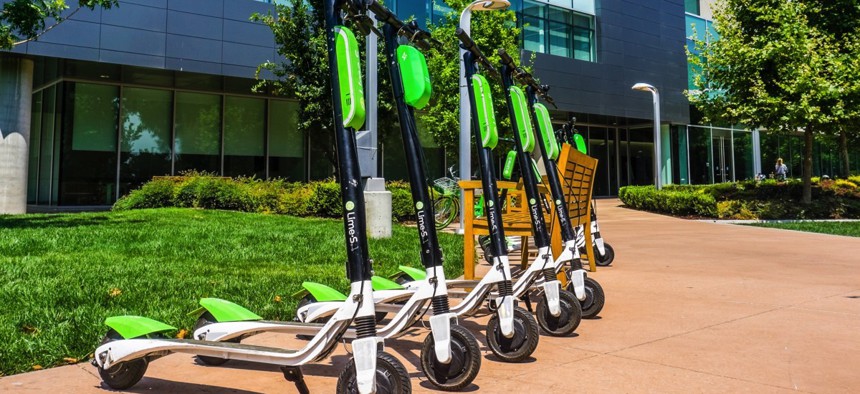San José Offers a Scooter Ultimatum

Operations that fail to implement geofencing or a similar safety solution by July 1 will be scuttled by the California city.
At least one electric scooter-sharing company is working collaboratively with San José, California, after city officials proposed imposing geofencing technology requirements before the scooters can operate.
Geofencing creates a virtual boundary that triggers an action when crossed by a mobile device, and San José wants e-scooters to either halt or drop to about 5 mph on pedestrian-dense sidewalks downtown and near transit stops.
Mayor Sam Liccardo and council members Dev Davis and Raul Peralez cited “widespread reports of serious injuries and two deaths” due to e-scooter collisions in U.S. cities as the reason for their memo recommending new guidelines. The proposal will be presented to City Council on Dec. 18.
While e-scooter-sharing company Lime did not specifically mention geofencing in its response, it did stress that reducing congestion is a mutual goal.
“Lime has always educated users to not ride on the sidewalk, and abide by California's vehicle code,” said spokesman Joe Arellano in a Friday statement. “We are developing new solutions to ensure users follow the laws on the books, including both technological and operational methods to achieve the best outcome.”
Lime, Bird and Wind currently operate in San José.
The proposal would allow e-scooters roaming the busiest areas to operate at full speeds only within bike and shared lanes on the street. The goal would be to begin permitting in February 2019 and cease the pilots of any company that fails to implement geofencing on July 1.
Companies will be responsible for the sensors or other infrastructure needed for the geofencing, and the city manager will control their ability to access streets and poles for free or at low cost.
San José will also consider designating e-scooter parking areas to avoid scooters becoming tripping hazards, obstructing transit boarding, and blocking people with limited mobility or disabilities and cyclists.
Seattle, San Francisco and, most recently, Athens-Clarke County, Georgia, have all imposed temporary e-scooter bans due to safety concerns, but the mayor and council members are painting San José’s plan as a more collaborative solution in offering companies access to public rights-of-way for sensors and other infrastructure.
“E-scooters are a great solution for that last-mile connection in an urban setting,” said Davis in a statement. “We just want to make sure that last mile is safely traveled and people get to their destination without collisions or contusions.”
Liccardo said he became convinced geofencing or similar tech was possible after opening up a dialogue with companies like Lime and Bird. This began after he co-signed a letter to them with Ted Winterer, the mayor of e-scooter “ground zero” Santa Monica, California.
Bird did not respond to a request for comment by time of publication.
San José would expect permitted companies to share data on usage and routes to assist with future infrastructure planning and integrate with mobility-as-a-service apps.
Residents must also have the ability to report unsafe riding, according to the memo.
“[Y]our companies must devote more proactive attention to technological solutions that provide our residents with a better assurance of safety,” reads Liccardo and Winterer’s Oct. 22 letter. “Any competitor that successfully does so will benefit from the competitive advantage of regulatory changes in cities like ours that will pose existential risks of exclusion for companies that fail to innovate.”
Dave Nyczepir is a News Editor at Government Executive’s Route Fifty and is based in Washington, D.C.
NEXT STORY: Agility training for responder drones






